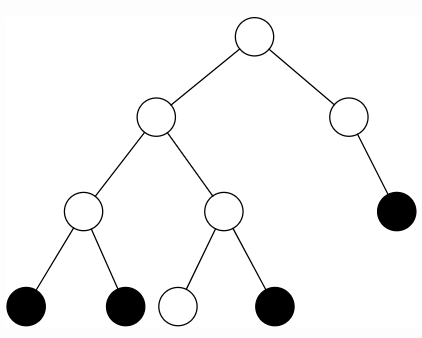思路
这道题对初学虚树的人来讲简直就是噩梦…之前打了一个 30 分暴力未果,遂转向题解。知道了一个叫做虚树的东西,然后抄了一下午的题解才 AC。
我先来解释一下虚树这个数据结构(?)。在一棵书上,会有关键点集和非关键点集,在一些问题中我们只需要用到关键点之间的关系,而非关键点集便不在那么重要。这个时候我们可以建立一个虚树。
建立虚树的过程相当之繁琐,我在这里不在详细讲,可以使用单调栈和 LCA 算法以极高的效率搞定。详细见:https://oi-wiki.org/ds/virtual-tree/
以下为代码:
// P3233.cpp
#include <cstdio>
#include <iostream>
#include <cstring>
#include <vector>
#include <algorithm>
#define pr pair<int, int>
using namespace std;
const int MX_N = 300020;
int head[MX_N], current;
struct edge
{
int to, nxt;
} edges[MX_N << 1];
int fa[MX_N], stfa[20][MX_N], n, dep[MX_N], anses[MX_N], id[MX_N], dfn = 0, q, m;
int tmpx, tmpy, st[MX_N], top = 1, tsiz[MX_N];
pr mx[MX_N];
bool vis[MX_N];
void addpath(int src, int dst)
{
edges[current].to = dst, edges[current].nxt = head[src];
head[src] = current++;
}
void preprocess()
{
for (int i = 1; i <= n; i++)
stfa[0][i] = fa[i];
for (int tim = 1; tim < 20; tim++)
for (int u = 1; u <= n; u++)
stfa[tim][u] = stfa[tim - 1][stfa[tim - 1][u]];
}
int jump(int u, int p)
{
for (int i = 0; i <= 19; i++)
if ((p >> i) & 1)
u = stfa[i][u];
return u;
}
int getLca(int a, int b)
{
// b is deeper;
if (dep[a] > dep[b])
swap(a, b);
b = jump(b, dep[b] - dep[a]);
if (a == b)
return a;
for (int tim = 19; tim >= 0; tim--)
if (stfa[tim][a] != stfa[tim][b])
a = stfa[tim][a], b = stfa[tim][b];
return fa[a];
}
void dfs_fa(int u)
{
id[u] = ++dfn;
tsiz[u] = 1;
dep[u] = dep[fa[u]] + 1;
for (int i = head[u]; i != -1; i = edges[i].nxt)
if (fa[u] != edges[i].to)
fa[edges[i].to] = u, dfs_fa(edges[i].to), tsiz[u] += tsiz[edges[i].to];
}
bool compare(const int &a, const int &b) { return id[a] < id[b]; }
void dfs_1(int u)
{
if (vis[u])
mx[u] = make_pair(0, u);
else
mx[u] = make_pair(1e8, 0);
for (int i = head[u]; i != -1; i = edges[i].nxt)
{
int to = edges[i].to;
dfs_1(to);
pr tmp = mx[to];
tmp.first = dep[mx[to].second] - dep[u];
mx[u] = min(mx[u], tmp);
}
}
void dfs_2(int u)
{
for (int i = head[u]; i != -1; i = edges[i].nxt)
{
pr p = mx[u];
p.first += dep[edges[i].to] - dep[u];
mx[edges[i].to] = min(mx[edges[i].to], p);
dfs_2(edges[i].to);
}
anses[mx[u].second] = max(anses[mx[u].second], tsiz[u]);
}
void dfs_3(int u)
{
for (int i = head[u]; i != -1; i = edges[i].nxt)
{
int x = mx[u].second, y = mx[edges[i].to].second;
if (x != y)
{
int dist = dep[x] + dep[y] - (dep[getLca(x, y)] << 1);
int z = jump(edges[i].to, (dist >> 1) - mx[edges[i].to].first);
if (dist & 1)
anses[x] -= tsiz[z];
else
{
if (z != u && z != edges[i].to)
z = jump(edges[i].to, (dist >> 1) - mx[edges[i].to].first - (x < y));
else if (z == u)
z = jump(edges[i].to, (dist >> 1) - mx[edges[i].to].first - 1);
anses[x] -= tsiz[z];
}
if (edges[i].to != z)
anses[y] += tsiz[z] - tsiz[edges[i].to];
}
dfs_3(edges[i].to);
}
}
int main()
{
memset(head, -1, sizeof(head));
scanf("%d", &n);
for (int i = 1; i < n; i++)
scanf("%d%d", &tmpx, &tmpy), addpath(tmpx, tmpy), addpath(tmpy, tmpx);
dfs_fa(1);
preprocess();
scanf("%d", &q);
while (q--)
{
current = 0;
scanf("%d", &m);
vector<int> harr, arrs;
for (int i = 1; i <= m; i++)
scanf("%d", &tmpx), vis[tmpx] = true, harr.push_back(tmpx), anses[tmpx] = 0, arrs.push_back(tmpx);
sort(harr.begin(), harr.end(), compare);
// start to build the virtual tree;
// prep for the stack;
st[top = 1] = 1, head[1] = -1;
for (int i = 0; i < m; i++)
{
if (harr[i] == 1)
continue;
int curtpt = harr[i], lca = getLca(curtpt, st[top]);
if (lca != st[top])
{
while (id[lca] < id[st[top - 1]])
addpath(st[top - 1], st[top]), top--;
if (id[lca] > id[st[top - 1]])
head[lca] = -1, addpath(lca, st[top]), st[top] = lca;
else
addpath(lca, st[top--]);
}
head[curtpt] = -1, st[++top] = curtpt;
}
for (int i = 1; i < top; i++)
addpath(st[i], st[i + 1]);
dfs_1(1), dfs_2(1), dfs_3(1);
for (int i = 0; i < m; i++)
printf("%d ", anses[arrs[i]]);
printf("\n");
for (int i = 0; i < m; i++)
vis[arrs[i]] = false;
}
return 0;
}
